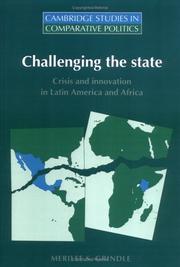| Listing 1 - 3 of 3 |
Sort by
|

ISBN: 0521559197 0521551064 0511521820 9780521551069 9780511521829 9780521559195 Year: 1996 Publisher: Cambridge: Cambridge university press,
Abstract | Keywords | Export | Availability | Bookmark
 Loading...
Loading...Choose an application
- Reference Manager
- EndNote
- RefWorks (Direct export to RefWorks)
The 1980s and 1990s posed great challenges to governments in Latin America and Africa. Deep economic crises and significantly heightened pressure for political reform severely taxed their capacity to manage economic and political tasks. These crises pointed to an intense need to reform the state and redefine its relationship to the market and civic society. This book examines the paradox of states that have been weakened by crisis just as their capacity to encourage economic development and provide for effective governance most needs to be strengthened. Case studies of Mexico and Kenya allow the author to analyse the opportunities available for political leadership in moments of crisis, and the constraints on action provided by leadership goals and existing political and economic structures. She argues that while leaders and political structures are often part of the problem, they can also be part of the solution in building more efficient, effective, and responsive states.
Africa --- Kenya --- Latin America --- Mexico --- Afrique --- Amérique latine --- Mexique --- Economic policy --- Politics and government --- Politique économique --- Politique et gouvernement --- Political philosophy. Social philosophy --- Political systems --- Political sociology --- 1948 --- -Latin America --- 1960 --- -Africa --- 1970-1988 --- 1988 --- -Kenya --- Mexico - Economic policy - 1994 --- -Kenya - Politics and government - 1978 --- -Mexico --- 1970 --- From 1978 --- Africa - Politics and government - 1960 --- -Mexico - Politics and government - 1970-1988. --- Mexico - Politics and government - 1988 --- -Mexico - Economic policy - 1970 --- -Political philosophy. Social philosophy --- Social Sciences --- Political Science --- Cenia --- Chenia --- Colony and Protectorate of Kenya --- GOK --- Government of Kenya --- Jamhuri ya Kenya --- Kenia --- Kenii︠a︡ --- Kenniya --- Kenya Colony and Protectorate --- Ḳenyah --- Kīniyā --- Kīnyā --- Quênia --- Republic of Kenya --- Кения --- קניה --- كينيا --- ケニア --- 肯尼亚 --- East Africa Protectorate --- Asociación Latinoamericana de Libre Comercio countries --- Neotropical region --- Neotropics --- New World tropics --- Spanish America --- Economic policy. --- Latin America - Politics and government - 1948 --- -Latin America - Economic policy --- -Africa - Economic policy --- -Kenya - Economic policy --- Mexico - Politics and government - 1970-1988 --- Mexico - Economic policy - 1970 --- -Africa - Politics and government - 1960
Book
ISBN: 0674070038 0674065182 9780674065185 9780674065703 0674065700 Year: 2012 Publisher: Cambridge (Mass.) Harvard University Press
Abstract | Keywords | Export | Availability | Bookmark
 Loading...
Loading...Choose an application
- Reference Manager
- EndNote
- RefWorks (Direct export to RefWorks)
Patronage systems in the public service are universally reviled as undemocratic and corrupt. Yet patronage was the prevailing method of staffing government for centuries, and in some countries it still is. In Jobs for the Boys, Merilee Grindle considers why patronage has been so ubiquitous in history and explores the political processes through which it is replaced by merit-based civil service systems. Such reforms are consistently resisted, she finds, because patronage systems, though capricious, offer political executives flexibility to achieve a wide variety of objectives. Grindle looks at the histories of public sector reform in six developed countries and compares them with contemporary struggles for reform in four Latin American countries. A historical, case-based approach allows her to take into account contextual differences between countries as well as to identify cycles that govern reform across the board. As a rule, she finds, transition to merit-based systems involves years and sometimes decades of conflict and compromise with supporters of patronage, as new systems of public service are politically constructed. Becoming aware of the limitations of public sector reform, Grindle hopes, will temper expectations for institutional change now being undertaken.
Civil service --- Public officers --- Patronage, Political --- Civil service reform --- Merit system --- Spoils system --- Political patronage --- Elected officials --- Government leaders --- Government officials --- Officers, Public --- Officials, Elected --- Officials, Government --- Officials, Public --- Public officials --- Public administration --- Bureaucrats --- Career government service --- Civil servants --- Government employees --- Government service --- Public employees --- Public service (Civil service) --- Public service employment --- Selection and appointment --- Law and legislation --- Legal status, laws, etc. --- Clientelism, Political --- Patron-client politics --- Political clientelism --- Political sociology

ISBN: 0801877881 9780801877889 0801864208 9780801864209 0801864216 9780801864216 Year: 2000 Publisher: Baltimore Johns Hopkins University Press
Abstract | Keywords | Export | Availability | Bookmark
 Loading...
Loading...Choose an application
- Reference Manager
- EndNote
- RefWorks (Direct export to RefWorks)
Audacious Reforms examines the creation of new political institutions in three Latin American countries: direct elections for governors and mayors in Venezuela, radical municipalization in Bolivia, and direct election of the mayor of Buenos Aires in Argentina. Diverging from the usual incremental processes of political change, these cases marked a significant departure from traditional centralized governments. Such "audacious reforms," explains Merilee S. Grindle, reinvent the ways in which public problems are manifested and resolved, the ways in which political actors calculate the costs and benefits of their activities, and the ways in which social groups relate to the political process. Grindle considers three central questions: Why would rational politicians choose to give up power? What accounts for the selection of some institutions rather than others? And how does the introduction of new institutions alter the nature of political actions? The case studies of Venezuela, Bolivia, and Argentina demonstrate that institutional invention must be understood from theoretical perspectives that stretch beyond immediate concerns about electoral gains and political support building. Broader theoretical perspectives on the definition of nation and state, the nature of political contests, the legitimacy of political systems, and the role of elites all must be considered. While past conflicts are not erased by reforms, in the new order there is often greater potential for more responsible, accountable, and democratic government.
Local elections --- Decentralization in government --- Central-local government relations --- Democracy --- Political participation --- Citizen participation --- Community action --- Community involvement --- Community participation --- Involvement, Community --- Mass political behavior --- Participation, Citizen --- Participation, Community --- Participation, Political --- Political activity --- Political behavior --- Political rights --- Social participation --- Political activists --- Politics, Practical --- Self-government --- Political science --- Equality --- Representative government and representation --- Republics --- Center-periphery government relations --- Local-central government relations --- Local government-central government relations --- Federal government --- Centralization in government --- Devolution in government --- Government centralization --- Government decentralization --- Government devolution --- Local government --- Public administration --- County elections --- Elections, County --- Elections, Local --- Elections, Municipal --- Municipal elections --- Election law --- Elections --- Law and legislation --- Elections locales --- Décentralisation administative --- Relations gouvernement central-collectivités locales --- Démocratie --- Participation politique --- Case studies. --- Case studies --- Cas, Etudes de --- Etudes de cas
| Listing 1 - 3 of 3 |
Sort by
|

 Search
Search Feedback
Feedback About UniCat
About UniCat  Help
Help News
News